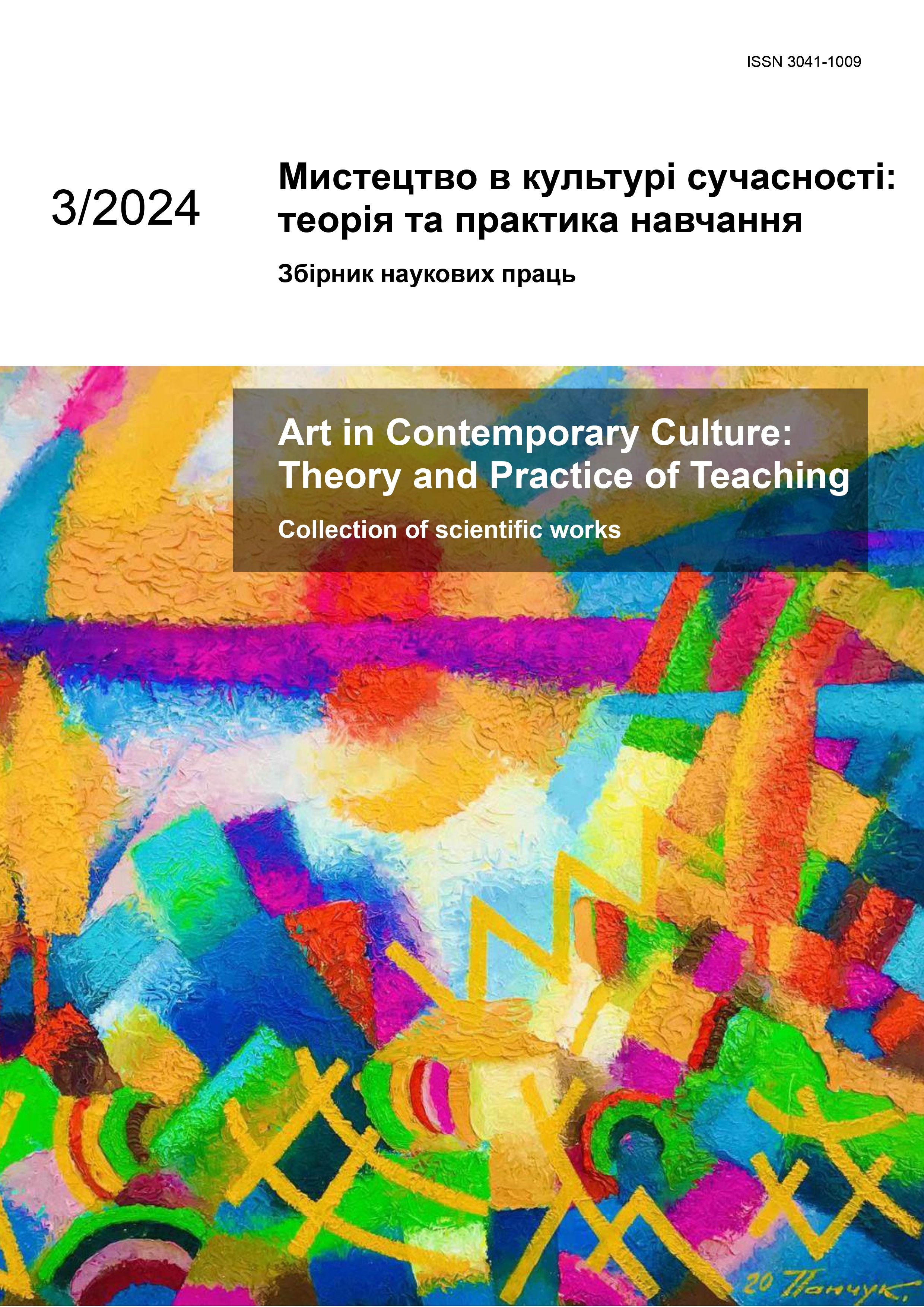SCIENTIFIC APPROACHES AND PRINCIPLES OF FORMING THE ARTISTIC AND AESTHETIC EXPERIENCE OF ADOLESCENT STUDENTS IN THE PROCESS OF PIANO TRAINING
Published 2024-12-27
Keywords
- scientific approaches, principles, artistic and aesthetic experience, teenagers, piano training
Copyright (c) 2024 Оксана Сущенко

This work is licensed under a Creative Commons Attribution 4.0 International License.
How to Cite
Abstract
The article highlights scientific approaches and principles defining the concept of methodical support of the process of forming the artistic and aesthetic experience of teenagers in piano lessons. Such approaches are: axiological (considers the educational process from the point of view of the aesthetic values of art); hedonistic (includes the desire for pleasure, enjoyment, joy, positive experience from communication with musical works); person-oriented (covers concepts and means of organizing subject-subject interaction in the process of piano learning); reflective (based on introspection of personal artistic interpretation, selfevaluation and self-control of musical and performing actions); active (oriented to the activation of musical and performing activities of an artistic and aesthetic direction). The main principles are the principle of artistic and aesthetic determination of the musical and performing process; emotional aesthetic understanding of the content and aesthetic values of musical works, dialogic interaction and artistic-pedagogical communication between the teacher and the student, orientation towards artistic-aesthetic self-expression. The main principles of forming the artistic-aesthetic experience of teenagers in the process of piano training are defined, such as: the principle of artistic-aesthetic determination of the musical-performance process - determined by the fact that all stages of the educational-performance activity are permeated with artistic-aesthetic direction; emotional-aesthetic understanding of the content and aesthetic values of musical works - implies the presence of emotional response/impressions, empathy, aesthetic judgments of schoolchildren during awareness and evaluation of the artistic-aesthetic content of musical images; dialogic interaction and artistic-pedagogical communication between teacher and student, based on openness, empathy, friendly communication and interpersonal interaction, which achieves its effectiveness through mutual trust, respect and joint reflection; orientation to artistic and aesthetic self-expression implies self-actualization, self-development, and self-realization of the student-pianist from the point of view of the artistic and aesthetic dimension of his musical and performing activities.
Downloads
References
- Виногородський А. М., Булах І. С. Рефлексивний пошук як механізм вирішення конфліктів у підлітковому віці. Вінниця, 1997. 145 с.
- Глущук Т. В. Музично-виконавське мистецтво як об’єкт дослідження українського мистецтвознавства. Культура і сучасність. 2016. № 1. С. 87–91.
- Гризоглазова Т. І. Методика навчання гри на фортепіано: навчальний посібник Київ : Вид-во НПУ імені М. П. Драгоманова, 2018.169 с.
- Джола Д. Н. Естетичне відношення людини до дійсності як предмет естетичного виховання. дис. … канд. пед. наук: 13.00.04 – теорія і методика професійної освіти. Київ, 1973. 158 с.
- Корзун В. В. Художня інтерпретація музичних творів як вищий щабель виконавської майстерності. Наукові записки [Національного педагогічного університету ім. М. П. Драгоманова]. Сер.: Педагогічні та історичні науки. 2014. Вип. 120. С. 74‒79.
- Падалка Г. М. Педагогіка мистецтва: теорія і методика викладання мистецьких дисциплін. Київ : Освіта України, 2008. 274 с.
- Рудницька О. П. Педагогіка: загальна та мистецька: Навчальний посібник. Тернопіль: Навчальна книга Богдан, 2005. 360 с.
- Стеценко Л. Гедонізм: Моделі Теоретичної Реконструкції. Вісник Київського національного університету імені Тараса Шевченка Філософія. Політологія. 4 (114) / 2013. С. 57‒60.
- Kozyr A., Labunets V., Pankiv L., Liming W., Geyang Zh. Methodological aspects of modernization of professional training of future music teachers. Utopia y Praxis Latinoamericana. Revista Internacional de Filosofia y Teoria Social. 2020. Vol. 25. P. 370-377.
- Siao, L. Characteristic features of self-expression during preparation future teachers of musical art, OD, vol. 35, no. 4, pp. 196–209, Nov. 2021.




